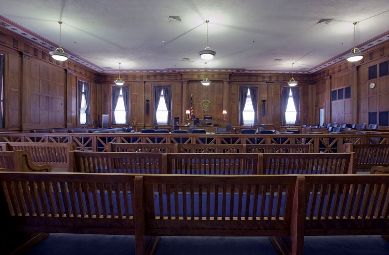Open Doors Program
The Open Doors Program is a national initiative that local federal judges conduct in their courtrooms. The event, which is presided over by the host judge, involves students in learning about the courts and also some of the history involved in the court they are visiting. There are many learning opportunities for teachers and students at federal courts. Some of the activites that may be included are below:
-
Observe a trial
Often there will be a court session when students are visiting. Most, but not all, of these sessions are open to the public, including groups of students. Teachers can find out what is on the docket for the day they are planning to visit and request to bring students into the courtroom. Students should be prepared for the visit so that they understand what they see. Proper rules of decorum, including dress codes, must be followed if a class comes to observe a court session.
-
Take a tour
Taking a tour of a federal court can help students better understand court procedure and the jobs of those who work in the courts. Students will learn what happens in the federal court behind the scenes, information they don't see on television court dramas. While students usually cannot visit judges' chambers, they can tour a courtroom and talk to court personnel about how trials and hearings are conducted. If time permits, students may even be able to role play certain aspects of court procedure, such as voire dire, in the courtroom.
-
Interview/converse with a judge or other personnel
Many judges are willing to talk to students about the federal courts and their role in them. They will often speak to students in an empty courtroom to help students visualize the procedures they describe. However, judges have ethical guidelines that prohibit them from discussing cases that are pending before them. Speaking personally to a judge can demystify the court experience for students, making them less fearful or suspicious of the legal process. Other participants in the legal process also may be willing to speak to students. Federal prosecutors and public defenders can help to illuminate the adversarial system. No matter who speaks to the students at the courts, it is important that students be prepared for the interaction. Help them draft questions before and during the visit to ensure a productive learning experience.
-
How does a teacher set up a visit to the court?
To set up a visit, teachers should contact the clerk's office in the court they wish to visit. Because the courts tend to be very busy, teachers should be prepared to allow several weeks of lead time when they are arranging a visit. The telephone number for each office is:
- Albany - (518) 257-1803
- Binghamton - (607) 773-2893
- Syracuse - (315) 234-8512
The personnel in the clerk's office can help teachers select an appropriate date for a class visit and can even find out what cases are on the docket if students wish to observe a court session.
-
How should teachers prepare students before visiting the courts?
The best time to visit a court is during a unit on the judicial system or the rights that the system protects. In this context, students can put their new knowledge to use by observing and interpreting court sessions and finding out more information from judges and other court personnel. In particular, it may be helpful for students to learn about the structure, functions, and procedures of the court before attending. U.S. courts have a set of basic lesson plans about the federal judicial system that teachers may use for free.
However, it also may be useful to conduct one or more lessons on judicial basics while the students visit the court. Judges and others may then help conduct lessons. If there is a structured activity for students, teachers, and court personnel to engage in while at the courts, the students may find the experience more interesting than simply being talked to. If you choose to conduct a lesson while at the court, be sure to talk to the judge or other court employee before hand to make sure that they understand their roles in the learning process. The federal courts offer interactive lesson plans, "Courts to Classes."

